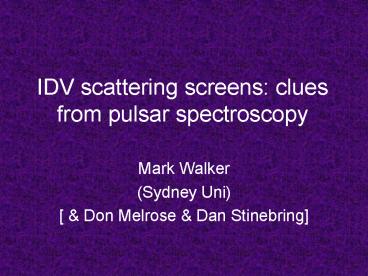IDV scattering screens: clues from pulsar spectroscopy PowerPoint PPT Presentation
1 / 17
Title: IDV scattering screens: clues from pulsar spectroscopy
1
IDV scattering screens clues from pulsar
spectroscopy
- Mark Walker
- (Sydney Uni)
- Don Melrose Dan Stinebring
2
Outline
- Why study IDV screens with pulsars?
- Key observed phenomena arcs and arclets
- Interpretation distant IDV screens
- Current directions prospects
- The screen population very local examples
3
Background
- Rapid scintillation of PKS0405, J1819 PKS1257
is due to local phase screens - Ordinary sources, but extraordinary sightlines
(Tb 1012 K favours screens which are nearby) - Pulsars ( Tb gtgt 1012 K) avoid this bias
- Pulsar spectra exhibit fully modulated
interference fringes from multipath propagation
4
Normal Dynamic Spectrum
- PSR B113316 (Ooty data Gupta, Bhat Rao 1999)
- Mottled appearance due to random interference
maxima
5
Anomalous spectrum
- Obvious fringe pattern (multiple imaging)
- Natural representation is the power-spectrum of
the dynamic spectrum
6
Another anomalous spectrum
- PSR B192910 Arecibo data
Hill et al 2003 ApJ - Criss-cross patterns what do they tell us?
7
More anomalies
B083406 Arecibo data showing arclets whose
apexes follow a parabola Courtesy Dan
Stinebring
8
Recent recognition that
(Stinebring et al 2001 ApJL)
- Parabolic arcs (and arclets) are generic features
of pulsar secondary spectra. - Parabolic distribution of power is natural
Doppler-shift prop to qx
(Geometric) delay prop to qx2
qy2 - Thin screens are responsible.
9
Expected power distribution
Isotropic Kolmogorov model
Anisotropic Kolmogorov model
(Purely geometric delays assumed.)
10
Snapshots
11
Implications
- Patchy illumination --gt power concentrations on
scales lt 0.15 AU (083406) - Power concentrations may be diffractive
(localised scattering) or refractive (lens-like) - Scattering angles comparable to what is expected
from IDV screens - Vscr not large compared with Vpsr
12
Summary
- Pulsar spectroscopy often reveals anomalous
scattering from one or more thin screens - Scattering angles as expected for IDV screens
(l2.2 scaling) - Strong anisotropy is common
- Velocities are not large
- Consistent with distant, IDV-type screens
- Starting to tap into a rich information source
--- great variety of power distributions seen
13
Current pulsar directions
- Image with N speckles exhibits N2 interference
terms in the secondary spectrum, so complete
reconstruction of the image is possible. - Veff variations through orbit (Earth/PSR)
determine Vscr and Dscr - Multi-station (VLBI) cross-power spectrum yields
direct measures of image structure, orientation
and angular scale
14
PKS0405-385 (Kedziora-Chudczer et al 2001 ApSS)
15
Connection between IDV and lensing events?
- Estimate tlens 1 / 2000, Rlens 2 AU, so
if path-length 1 kpc, then
n 1000 pc-3
16
Are there very local screens?
- J1819 is a line-of-sight with an unusually close
screen t n s D1819 1 / 700 (MASSIV) - Closest screen at Dmin / D1819 8 (R / D1819)
2/3 - Estimate s p R2 ,
with R gt 5 yrs at 30 km/s --gt 30 AU - Hence n lt 2,000 (D1819 / 10 pc)-1 screens / pc3
- There are lt 107 (D1819 / 10 pc)2 closer
screens
17
Can we find them?
- Closest screen at 0.05 pc if R 30 AU
- Would cause fast variability even below 1 GHz
- For screen at D D1819 / 100, expect
tvar (0.25, 2) hr at (843, 327) MHz - Need SUPER-MASSIV 100 x MASSIV, with 105
compact sources - SUPER-MASSIV SUMSS? WENSS?

